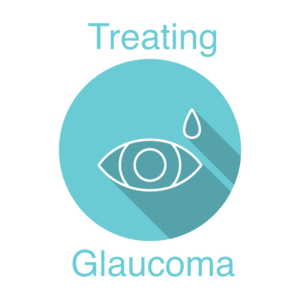Medications and Eye Drops for Treatment of Glaucoma
February 8, 2018
 The most common method of treating glaucoma is with eye drops. While laser treatment and glaucoma surgery may be required, eye drops are the most common "first choice."
The most common method of treating glaucoma is with eye drops. While laser treatment and glaucoma surgery may be required, eye drops are the most common "first choice."
There are many causes of glaucoma. The best way to treat a particular type of glaucoma is by treating the underlying cause. "Open Angle Glaucoma" is the most common form of this disease found in the United States, where the goal of treatment is to reduce the intraocular pressure (IOP).
Here are medications often used to treat glaucoma.
Eye Drops for Glaucoma
The most common medications for lowering IOP are eye drops. Each medication either reduces the production of aqueous humor (fluid produced inside the eye) or increases the drainage of the internal fluid.
Here are the different categories of eye drops used to treat glaucoma:
- Prostaglandins - increases drainage of aqueous humor (AH)
- Xalatan
- Lumigan
- Travatan Z
- Zioptan
- Beta Blockers - decreases production of aqueous humor. Timolol is an example
- Alpha Agonists - decrease production AND increase drainage
- Alphagan (brimonidine)
- Iopidine (apraclonidine)
- Carbonic Anhydrase Inhibitors (CAIs) - decrease production of fluid
- Trusopt (dorzolamide)
- Azopt (brinzolamide)
- Combined Medications - eye drops contain more than one medication
- Cosopt (beta blocker + dorzolamide)
- Combigan (beta blocker + brimonidine)
- Simbrinza (brimonidine + brinzolamide)
- Cholinergic agonists - Pilocarpine is still available, but not used often due to side effects
Oral Medications
There are two oral medications used to treat glaucoma. Both reduce production of AH and are carbonic anhydrase inhibitors (see above):
- Diamox
- Neptazane
Side Effects of Medications
Eye drops are not benign and can have significant side effects.
Topical eye drops are rapidly and efficiently absorbed into our body. Excessive drops drain into our tear ducts which are connected to our nasal passages and are absorbed.
All eye drops can have side effects. For example, beta blockers such as Timolol, can slow your pulse, cause low blood pressure, dizziness or shortness of breath. If you have concerns about eye drops and the possible side effects or if you have questions about your own eye drops, please consult with your own doctor.
If have questions about glaucoma or to schedule an appointment with Dr. Rose or Dr. Whitten at any of our locations, please call or email us!

Shilpa Rose, M.D.
Vision Correction & Dry Eye Specialist
Mark Whitten, M.D.
Vision Correction Surgeon
LASIK, Cataract & Raindrop



